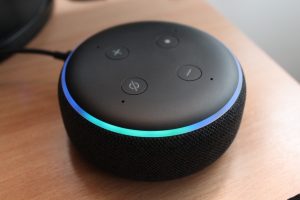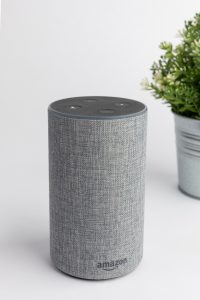POSTGRADUATE students from the University of Glasgow have created conversational assistants that perform a range of helpful tasks as part of an Amazon challenge.
The computing science students were chosen by Amazon from over 125 entries across 15 countries to compete in the Alexa Prize Taskbot Challenge.
The student team is part of the Glasgow Representation and Information Learning Lab (GRILL) who are beginning work on the assistant to help Amazon Alexa users to complete real-world tasks.

Postgraduate students from the University of Glasgow have been selected by Amazon to compete in competition.
The GRILL team is made up of the School of Computing Science graduate students Sophie Fischer, Carlos Gemmell, Ian Mackie, Paul Owoicho and Federico Rossetto.
The digital assistant designed by the team named ‘conversational Al’ can perform tasks such as cooking and home improvement.
The group will receive a research grant of $250,000 (£176,500) to support them over the next year.

The GRILL team have created ‘Conversational Al’
They will also receive four Amazon Alexa gadgets, free access to Amazon Web Services and they will get support from the Amazon Alexa team.
The Alexa Prize is an annual university competition which is dedicated to advancing the conversational artificial intelligence field.
The prize recognises students globally who are actively changing the way we interact with technology.
The team’s leader Carlos Gemmell said: “We’re thrilled that our entry was successful, and we’re excited to begin work on the Alexa Taskbot project.
“Over the next 12 months, we’ll develop novel multimodal deep learning algorithms grounded in tasks that people do in the real world.”
He added: “It will be capable of understanding what users require when performing a task and how to guide them through it by reasoning over past interactions, a structured representation of the task, and curated documents.”
“The project aims to develop new conversational question answering technology specialized for complex tasks using state-of-the-art neural deep learning models. Having access to Alexa users around the world will allow us to receive real-time feedback and help us to make it an invaluable task assistant.”

Conversational Al can do a range of household tasks.
Dr Jeff Dalton, Lecturer in the School of Computing Science is the team’s advisor and will help guide the project.
Dr Dalton said: “As an amateur chef myself, as well as an artificial intelligence researcher, I’m excited to work with the team as they cook up in the lab in the coming months.
“Conversational AI assistants like Alexa have come a long way in recent years, but ambitious projects like this are vital to significantly advance their abilities.
“The team aims to help agents understand what users are doing and how they’re doing it by grounding conversations in the world.”
He added: “Ultimately, we hope that GRILL will be able to help people solve complex tasks in the kitchen and beyond. To adapt a recipe to the unexpected dietary preferences of a dinner party guest, explain the reason for adding cornstarch to scrambled eggs and diagnose failed sourdough bread.
“Although this is an ambitious vision beyond current capability, our team will make key advances towards this goal with multi-modal and visually grounded conversation capability.”
To succeed in the challenge, notable advancements in conversational Al is required.
Over the next year, feedback from Alexa customers’ will help to improve collaborative conversational agents.

